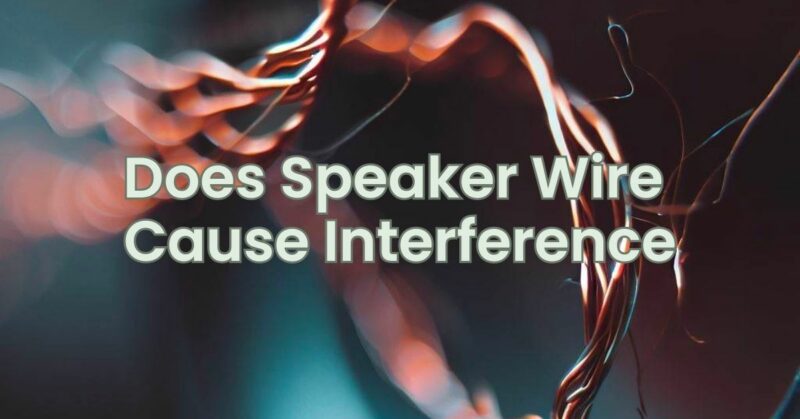When it comes to setting up a speaker system, one of the common concerns is the potential for interference that can degrade audio quality. Speaker wire plays a crucial role in transmitting the audio signal from the amplifier to the speakers, and it is natural to question whether it can cause interference. In this article, we will explore the topic of speaker wire and its potential to introduce interference into the audio signal.
Speaker wire is specifically designed to carry electrical signals from the audio source, typically an amplifier, to the speakers. It is constructed using conductive materials, such as copper or aluminum, to ensure efficient transmission of the audio signal. The wire’s primary purpose is to deliver the electrical current required to drive the speakers and produce sound.
Interference, on the other hand, refers to the introduction of unwanted signals or noise that can distort or degrade the audio signal. Interference can come from various sources, including electromagnetic interference (EMI) and radio frequency interference (RFI). EMI is generated by electrical devices or power sources, while RFI refers to interference caused by radio frequency transmissions.
While speaker wire itself does not generate interference, it can potentially act as an antenna and pick up external interference if it is not properly shielded. The length and routing of the wire, as well as its proximity to other electrical devices or power sources, can impact its susceptibility to interference. If the wire is inadequately shielded or routed too close to sources of EMI or RFI, it may pick up those unwanted signals and introduce them into the audio path.
However, it’s important to note that modern speaker wires are often designed with shielding or insulation to minimize the effects of interference. Shielding provides a layer of protection against EMI and RFI, reducing the likelihood of interference reaching the audio signal. High-quality speaker wires typically include features such as twisted pair construction or braided shielding to further enhance the protection against interference.
In addition to the wire itself, the overall system setup can also contribute to interference. Improper grounding or inadequate isolation between power cables and speaker wires can lead to interference issues. It is essential to follow best practices when routing and connecting the wires, ensuring proper separation from other cables and avoiding crossing them at right angles.
To mitigate the potential for interference, consider the following tips:
- Use quality speaker wire: Invest in high-quality speaker wire with proper shielding and insulation to minimize the risk of interference.
- Proper routing: Avoid running speaker wires parallel to power cables or other sources of EMI. Maintain a safe distance and cross cables at 90-degree angles whenever possible.
- Grounding: Ensure proper grounding of your audio system and adhere to manufacturer recommendations for connecting the wires.
- Cable management: Keep cables organized and tidy to reduce the chances of wires picking up interference or introducing signal degradation.
- Testing and troubleshooting: If you notice interference in your audio system, conduct tests and isolate potential sources of interference. Adjust cable routing or consider upgrading to better shielded speaker wire if necessary.
In summary, while speaker wire itself does not generate interference, it can be susceptible to picking up external interference if not properly shielded or routed. Modern speaker wires are typically designed with shielding or insulation to minimize the effects of interference. By using quality speaker wire, following proper routing techniques, and ensuring proper grounding, you can significantly reduce the likelihood of interference and enjoy optimal audio performance from your speaker system.


